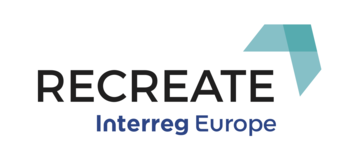The Greek Virtual Study Visit was organised by the Development Agency of South Aegean Region – READ S.A. online on 18th May 2022. This was the second of four events, each one hosted by a different RECREATE partner, with the aim of presenting two Good Practices in terms of business support offered to transport SMEs specifically during the COVID-19 pandemic.
After a brief summary of the RECREATE project’s main goals and objectives, the peculiarities of a small insular region during the COVID and post COVID era were shown. The pandemic caused several islands serious isolation – due to tourism ban and circulation restrictions even for the locals that led to significant economic losses and to an irrefutable need to overcome the relevant barriers – and ended up with new sustainable solutions. In this regard, several good initiatives were put in place; the two most relevant ones for the region were presented.
The first one is the "NISIDA" programme, a support measure for small and micro-enterprises affected by COVID-19 in the South Aegean Region and funded by the ERDF, under the South Aegean ROP. Considering that regional enterprises were and still are suffering significant economic losses because of the restrictions implemented to reduce the outbreak of COVID-19, the primary objective of the programme, through which funding was approved for at least 10 transport SMEs (related to terrestrial and maritime transport), was to face the relevant difficulties.
This programme offers support to small and micro-enterprises in the South Aegean Region that were affected by the pandemic in the form of a non-repayable grant, under the priority axis 01 “Support competitiveness and innovation”, investment priority 3a "Promoting entrepreneurship, in particular by facilitating the economic exploitation of new ideas and strengthening the creation of new businesses, inter alia, including incubators" of the South Aegean ROP.
Public funding covered a Working Capital equal to 50% of the enterprise’s expenses in 2019, in a scale between €2000 and €10000. It reached a total of €39,5 million. Funding was provided to a total of 3,705 beneficiaries under four main categories: “Manufacturing – Wholesale” of the Secondary sector and “Tourism – Services”, “Retail” and “Catering” under the Tertiary sector.
The amount allocated to the South Aegean Region is the highest in percentage in relation to the other 12 Regions of the Country.
The second initiative refers to Support Measures to Bus, Railway, Tourist and Road Transport Tourist Enterprises that own Public Tourist Buses, funded by the Hellenic Ministry of Infrastructure and Transport. It is a Joint Ministerial Decision, co-signed by the Hellenic Ministry of Infrastructure and Transport and the Ministry of Tourism along with the Ministry of Finance that, considering the restriction imposed on public transport according to which passengers needed to keep distance and use 1 seat out of two, offers grant subsidies for the months of July and August 2020.
Compensation of the beneficiaries was calculated by taking into consideration the fullness of the passengers' seats of the itineraries of the periods 2017, 2018 and 2019 for the months of July and August. The total number of the offered seats, the cost of the ticket and the percentage of reduction of the potential fullness set at 35% were considered in the calculations.
The amount of allocated compensation was almost €49 million, while the share given to bus companies based in the South Aegean Region (Dodecanese and the Cyclades) corresponds to €875.529. In total 34 urban bus companies (KTEL) and 62 intercity companies (KTEL and KTEL SA) shared the compensation.
These two initiatives will be further analysed and properly elaborated in depth in order to be included in the Good Practices section of the project website and on the INTERREG EUROPE Good Practices database.
The final session of the event was dedicated to questions from the participants. All participants pointed out the similarities among different Countries’ implemented measures. The pandemic and the resulting economic crisis, apart from being a threat, constitutes an opportunity for restructuring and either survival or rapid development.
Stay tuned for the next Study Visits that will be held next semester!

